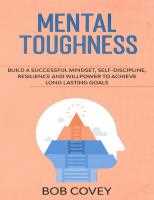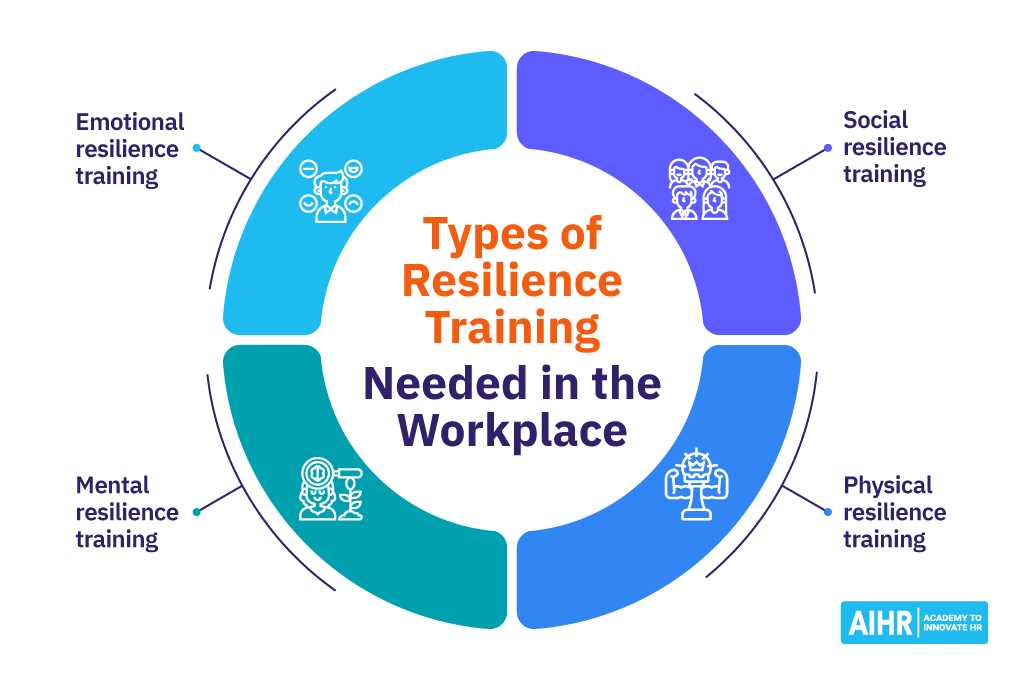
In today’s fast-paced and highly demanding world, it is crucial to develop the skills to handle stress and adaptability to maintain good mental health. Mastering resiliency is the key to building mental toughness, enabling individuals to bounce back from adversity and overcome challenges.
Mental toughness is not an innate trait but rather a skill that can be developed through training and practice. It involves cultivating a strong mindset that allows individuals to remain focused and composed in the face of stress and pressure. By building mental toughness, individuals can better cope with the demands of everyday life and achieve their goals.
Stress is a common factor in modern life, and learning to manage it is essential for overall well-being. Resiliency training equips individuals with the tools to effectively deal with stressors, enabling them to maintain a positive outlook and prevent the negative impact of stress on their mental health.
Furthermore, developing mental toughness enhances adaptability, allowing individuals to navigate through life’s challenges with greater ease. It enables individuals to embrace change and view setbacks as opportunities for growth and learning. By cultivating adaptability, individuals can build resilience and thrive in an ever-changing world.
Understanding Resiliency

Resiliency is the ability to cope with and adapt to stress, adversity, and challenges. It is a set of skills that can be developed and mastered through training and practice. Resiliency is essential for maintaining good mental health and well-being.
When faced with stressful situations, individuals with high levels of resiliency are able to bounce back and recover quickly. They are able to maintain a positive outlook and find ways to overcome obstacles. Resilient individuals are also more adaptable and flexible, able to adjust their thoughts and behaviors in response to changing circumstances.
Building resiliency involves developing a range of coping mechanisms and strategies. These may include problem-solving skills, emotional regulation techniques, and social support networks. By building these skills, individuals can better manage and navigate stressful situations.
Resiliency training is an important part of building mental toughness. It involves learning and practicing specific techniques and strategies to enhance resilience. This training can help individuals develop the skills and mindset needed to overcome challenges and thrive in the face of adversity.
Mastering resiliency is a lifelong journey. It requires ongoing effort and practice to continue building and strengthening these skills. However, the benefits of resiliency extend beyond just managing stress. Resilient individuals also tend to have better overall mental and physical health, as they are better equipped to handle the ups and downs of life.
| Benefits of Resiliency: | Skills for Building Resiliency: |
|---|---|
| – Better mental health | – Problem-solving |
| – Better physical health | – Emotional regulation |
| – Greater adaptability | – Social support |
| – Improved stress management | – Positive mindset |
In conclusion, understanding resiliency is crucial for building mental toughness. It involves developing coping skills, adaptability, and the ability to bounce back from adversity. Resiliency training can help individuals enhance these skills and improve their overall well-being.
What is Resiliency?

Resiliency is the ability to bounce back and adapt in the face of adversity, stress, and challenges. It is a set of skills that can be mastered through training and practice, and it plays a crucial role in building mental toughness.
Resiliency involves developing coping mechanisms and strategies to effectively manage stress and overcome obstacles. It is about being able to maintain a positive mindset and perspective, even in difficult situations.
Mastering resiliency requires developing skills such as problem-solving, emotional regulation, and self-care. It involves building a strong support system and cultivating a sense of purpose and meaning in life.
Resiliency is not about avoiding or ignoring stress; rather, it is about learning how to navigate and adapt to it. It is about being able to recover and bounce back from setbacks, failures, and disappointments.
By mastering resiliency, individuals can enhance their mental well-being and improve their ability to handle challenges. It allows them to remain calm, focused, and effective in high-pressure situations.
Overall, resiliency is a valuable skill that can be developed and strengthened through training and practice. It is an essential component of building mental toughness and adaptability, enabling individuals to thrive in the face of adversity.
The Importance of Resiliency

Resiliency is a crucial skill to master in order to maintain good mental health and cope with stress effectively. In today’s fast-paced world, where stressors are abundant, being mentally tough and resilient is more important than ever.
Resiliency refers to the ability to bounce back from difficult situations and adapt to change. It is not about avoiding stress or eliminating it completely, but rather about developing the skills to manage and navigate through it successfully.
When we face challenges and setbacks, our mental resilience helps us maintain a positive outlook and find constructive ways to cope. It allows us to stay focused, motivated, and determined, even in the face of adversity.
Building resiliency requires training and practice. Just like physical exercise strengthens our muscles, mental resilience can be developed through deliberate effort and training. By intentionally exposing ourselves to stressors and learning how to manage them, we can gradually build our resilience and improve our ability to handle stressful situations.
Resiliency has numerous benefits for our overall well-being. It helps us maintain a balanced perspective, allowing us to see challenges as opportunities for growth rather than insurmountable obstacles. It also enhances our problem-solving skills, as resilient individuals are more likely to come up with creative solutions to problems.
Furthermore, resiliency promotes better emotional health. When we are resilient, we are better equipped to manage our emotions and regulate our stress response. This can lead to improved relationships, as we are less likely to react impulsively or negatively in difficult situations.
In conclusion, resiliency is a vital skill to master for maintaining good mental health and coping with stress effectively. By investing time and effort in building our resiliency skills, we can improve our overall well-being and navigate through life’s challenges with greater ease.
Factors Affecting Resiliency

Resiliency, the ability to adapt and bounce back from challenges and stress, is influenced by various factors. These factors can impact an individual’s mental toughness and ability to cope with stressors.
1. Mental Health: Mental health plays a crucial role in building resiliency. Individuals with good mental health are better equipped to handle stress and bounce back from setbacks. Prioritizing mental health through self-care practices, therapy, and support systems can enhance resiliency.
2. Training and Skills: Developing specific skills and undergoing training can enhance resiliency. This includes learning effective problem-solving techniques, communication skills, and stress management strategies. Acquiring these skills can help individuals better cope with stress and navigate challenging situations.
3. Social Support: Having a strong support system can significantly impact resiliency. Surrounding oneself with supportive and understanding individuals can provide emotional support, guidance, and encouragement during difficult times. Social support can help individuals feel connected and increase their ability to bounce back from adversity.
4. Adaptability: Being adaptable and flexible in the face of change is an important factor in building resiliency. Being open to new experiences, ideas, and perspectives allows individuals to adjust and navigate through challenging situations. Adaptability helps individuals find alternative solutions and remain resilient in the face of adversity.
5. Stress Management: Effective stress management techniques are essential for building resiliency. Developing healthy coping mechanisms, such as exercise, mindfulness, and relaxation techniques, can help individuals manage stress and prevent it from overwhelming them. Building a toolbox of stress management strategies can enhance resiliency and improve mental toughness.
Overall, resiliency is influenced by various factors, including mental health, training and skills, social support, adaptability, and stress management. By focusing on these factors, individuals can build their resiliency and develop the mental toughness needed to navigate through life’s challenges.
Building Mental Toughness

Building mental toughness is essential for adaptability and resilience in the face of stress. It involves training and developing coping skills to maintain good mental health and master challenging situations.
Mental toughness is not about being unbreakable or unaffected by stress. It is about having the skills and mindset to bounce back from adversity and maintain a positive outlook. By developing mental toughness, individuals can better cope with stress and navigate through difficult times.
One key aspect of building mental toughness is developing adaptability. This involves being open to change and embracing challenges as opportunities for growth. By cultivating a mindset of flexibility and resilience, individuals can enhance their ability to adapt to new situations and overcome obstacles.
Another important aspect of building mental toughness is taking care of one’s health. Physical and mental well-being are interconnected, and maintaining a healthy lifestyle can contribute to overall resilience. Regular exercise, proper nutrition, and sufficient sleep can all help reduce stress and enhance mental toughness.
Training is also crucial in building mental toughness. Just as physical training strengthens the body, mental training can strengthen the mind. This can involve practicing mindfulness and meditation, engaging in positive self-talk, and seeking out challenges to overcome. By consistently training the mind, individuals can develop the resilience and mental toughness needed to face stress head-on.
In summary, building mental toughness is a process that involves developing coping skills, cultivating adaptability, taking care of one’s health, and engaging in mental training. By actively working on these areas, individuals can enhance their ability to cope with stress and build resilience in the face of adversity.

I am Patrina de Silva, a psychologist and mental health blogger in Sri Lanka. After obtaining psychology degrees from the University of Colombo and Monash University, I returned home to work as a counselor while also starting the popular blog “Pressy but Happy” to provide advice on psychological issues. Over the past decade, my empathetic articles have made my blog a leading mental health resource in the country. In addition to writing, I maintain a private therapy practice, frequently volunteer counseling time, and conduct seminars, driven by my passion for destigmatizing mental illness and educating the public on the mind-body connection. I strive to be an influential voice in my field through my compassionate approach.
